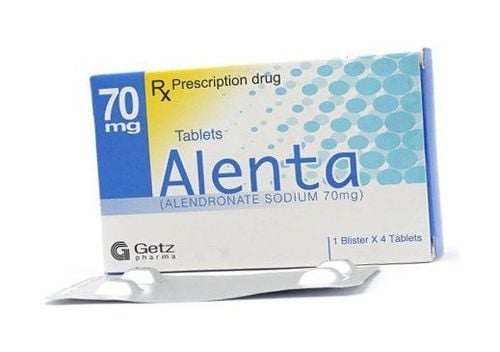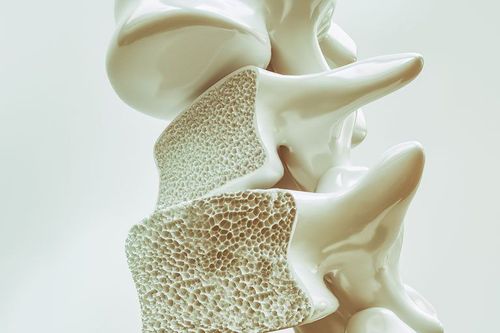This is an automatically translated article.
Drug Calcitriol 0 25 is indicated to prevent the risk of osteoporosis for subjects at high risk of osteoporosis. The main use of Calcitriol is to maintain blood calcium levels, enhance calcium absorption, and reduce the risk of fractures due to pathological osteoporosis.
1. Uses of the drug Calcitriol
Calcitriol medicine 0 25 has Calcitriol content of 0.25 mcg. Prepared in the form of soft capsules. Calcitriol is the form of vitamin D 3 , which has the main effect on stimulating intestinal calcium transport. Physiologically, calcitriol increases intestinal absorption of calcium and phosphate, which plays an important role in regulating bone mineralization. Calcitriol is a substance produced by the parathyroid glands in the body, but the production of calcitriol is of poor quality in patients with chronic kidney failure, thereby creating abnormalities in mineral metabolism, reducing production in stages. menopause, hypoparathyroidism.
When using oral calcitriol will help improve hypocalcemia, reduce symptoms of bone-related diseases. In patients with postmenopausal osteoporosis, oral calcitriol increases calcium absorption, increases calcitriol concentrations, and reduces the frequency of vertebral fractures. As a result, Calcitriol is indicated in the treatment of osteoporosis in postmenopausal women, reducing symptoms of hypocalcemia in chronic renal failure, idiopathic hypoparathyroidism, post-operative hypoparathyroidism...
2. Dosage and usage of the drug Calcitriol 0 25
How to use: The drug is taken orally, the patient needs to take the whole pill with the drug, do not chew the tablet. Should be taken in the morning.
Dosage:
Adults:
Patients with renal osteodystrophy:
Initial dose is 1 tablet of calcitriol 0 25mcg and administered once daily. If the condition is mild, the dose can be dosed with one tablet of calcitriol 0 25mcg, taken every other day. If there is no clinical response in 2 to 4 weeks, the dose may be increased to 0.25 mcg daily. During the period of drug use, serum calcium should be determined at least twice weekly. If serum calcium levels rise above normal or serum creatinine rises to > 120 μmol/l, the drug should be discontinued until serum calcium levels return to normal. Most patients will respond well to doses of 0.5 mcg to 1 mcg daily. Postmenopausal osteoporosis patients:
The recommended dose of calcitriol 0 25mcg is one tablet once and twice daily. Serum calcium and creatinine levels should be checked and determined at 1, 3, and 6 months, followed by a 6-month interval thereafter. Hypoparathyroidism:
The starting dose is 0.25 mcg/day, should be taken in the morning. Monitor clinical and biochemical parameters, if the patient does not improve after 2 to 4 weeks of treatment, the dose can be increased by 0.25 mcg/day, and calcium levels should be closely monitored. blood at least twice a week. Note that this is a reference dose, when used, it should be used according to the dose prescribed by the treating doctor.
Overdosage : Overdose can occur, because calcitriol is a vitamin D derivative, the symptoms of overdose are the same as those of an overdose of vitamin D. Acute symptoms of vitamin D toxicity include: Boredom. eating, headache, vomiting, constipation, dystrophy (asthenia), sensory disturbances, possibly fever with thirst, polyuria, lethargy, growth retardation and urinary tract infections. Hypercalcemia ensues, with calcification of the renal cortex, myocardium, lung, and pancreas.
Treatment in case of overdose: Immediate gastric lavage or induction of vomiting is required to prevent further absorption of the drug. Use extra liquid paraffin to promote the excretion of calcitriol in the stool. Serum calcium levels should be determined multiple times and a low-calcium diet is recommended. Once stabilized calcitriol can be restarted at a lower or the same dose but at less frequent intervals than before.
3. Possible side effects when using Calcitriol 0 25
When taking the drug you may experience some of the following effects:
Common: Hypercalcemia, headache, nausea, rash, urinary tract infection. Uncommon: Decreased appetite, vomiting, increased blood creatinine. Other side effects: Urticaria, frigidity, mental confusion, constipation, abdominal pain, paralytic ileus causing intestinal obstruction, erythema, pruritus, slow growth. When experiencing side effects, patients should notify their doctor for appropriate treatment measures.
4. Notes when using Calcitriol 0 25
Note when taking the drug if a sudden increase in calcium levels due to dietary changes or uncontrolled consumption of calcium products can cause hypercalcemia. Hypercalcemia can cause changes in neuromuscular transmission. Therefore, patients should be advised to strictly follow the prescribed diet to know the amount of calcium put into the body, to guide how to recognize the symptoms of hypercalcemia. Calcitriol is contraindicated in patients with hypercalcemia, drug allergy, evidence of metastatic calcification, acute toxicity of vitamin D. Note to use with people who have undergone surgery, especially with risk of hypercalcemia, patients with renal failure because of the risk of ectopic calcification. Patients with normal renal function who are taking calcitriol 0 25 may become dehydrated, requiring adequate hydration. Caution to pregnant women: Calcitriol should be used during pregnancy only if the potential benefit outweighs the risk to the fetus.
For nursing women: Because exogenous Calcitriol passes into breast milk, there is the potential to cause hypercalcemia in the mother and adverse reactions of calcitriol in the infant. Therefore, the mother can breastfeed while taking calcitriol, but maternal and neonatal serum calcium levels should be monitored.
Food interactions: Dietary guidelines should be followed, especially Especially regarding calcium supplements, avoid uncontrolled use of calcium-rich products.
Drug interactions: This may change how the drug works or increase the effect of side effects. Some drug interactions occur include:
Preparations containing calcium or vitamin D. Cholestyramine affects the absorption of calcium in the intestine. Phenobarbital, phenytoin: affect endogenous calcium synthesis, reduce serum calcium concentration. Digitalis: Causes hypercalcemia that may cause arrhythmias. Thiazide diuretics: Increases the risk of causing hypercalcemia in patients with hypoparathyroidism. Calcium channel blockers, antacids, and corticosteroids inhibit calcium absorption. Calcitriol is a drug indicated for the prevention of osteoporosis in subjects at high risk of osteoporosis. The main use of Calcitriol is to maintain blood calcium levels, enhance calcium absorption, and reduce the risk of fractures due to pathological osteoporosis. To ensure the effectiveness of treatment and avoid unwanted side effects, patients need to strictly follow the instructions of the doctor, professional pharmacist.
Follow Vinmec International General Hospital website to get more health, nutrition and beauty information to protect the health of yourself and your loved ones in your family.
Please dial HOTLINE for more information or register for an appointment HERE. Download MyVinmec app to make appointments faster and to manage your bookings easily.













